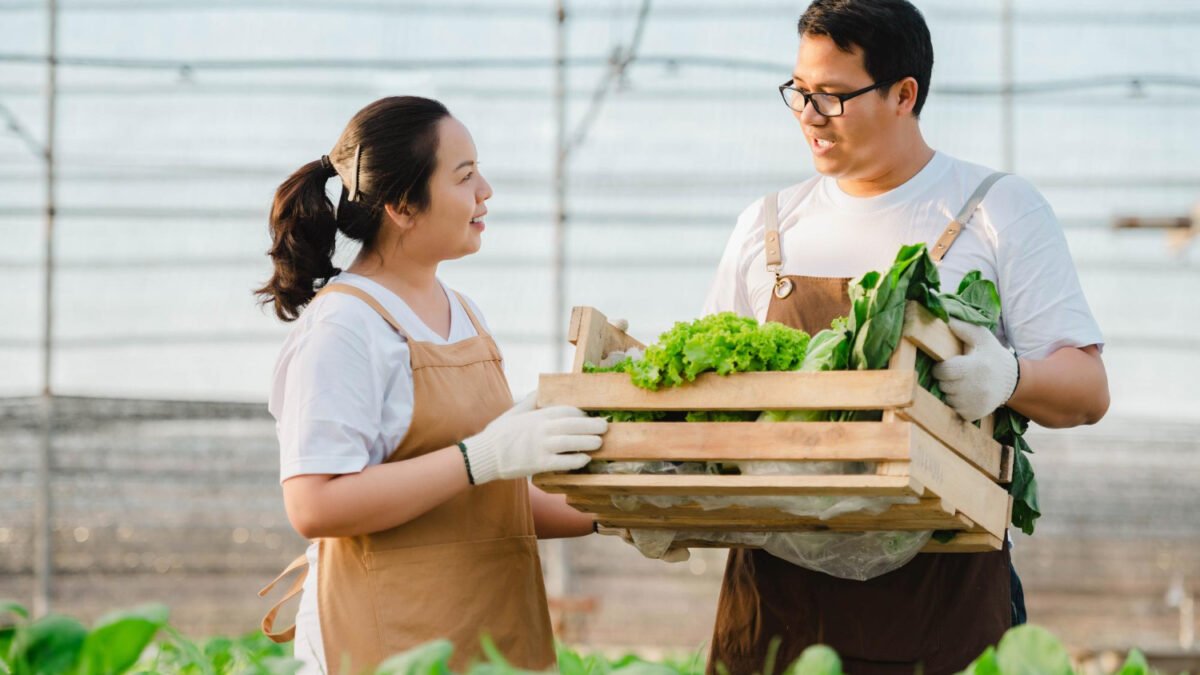Disclosure: Small Business Philippines strives to provide relevant and accurate information in all its articles. However, some information in our articles may differ or might be outdated from what you can see or read directly from the establishments’ or businesses’ websites. Please get in touch with us directly for any discrepancies.
Profitable small farm ideas refer to agricultural business concepts that have the potential to generate significant income while requiring minimal initial investment. These ventures cater to the growing demand for sustainable, locally-sourced food, and eco-friendly products.
In this comprehensive guide, we’ll discuss 10 profitable small farm ideas for entrepreneurs and business owners in the Philippines.
1. Organic Vegetable Farming
Organic vegetable farming involves growing crops without the use of synthetic pesticides or fertilizers. With the rising demand for organic produce in the Philippines, this small farm idea offers a lucrative opportunity.
The key to success in organic vegetable farming is selecting suitable crops for your region and employing sustainable farming practices. Popular crops include lettuce, tomatoes, and kale. Start by researching organic certification requirements in the Philippines and creating a business plan that outlines your goals and strategies.
2. Poultry Farming
Poultry farming entails raising domesticated birds, such as chickens, ducks, and turkeys, for meat or egg production. This small farm idea has a low entry barrier and quick returns on investment.
To get started, choose a poultry breed suited to your intended market, and invest in quality housing and feed. Proper hygiene and veterinary care are essential to maintain healthy birds and minimize disease outbreaks. Marketing your products through local markets and online platforms can help boost sales.
3. Mushroom Cultivation
Mushroom cultivation is a profitable small farm idea that requires minimal space and investment. Edible mushrooms, such as oyster and shiitake, are in high demand for their health benefits and culinary versatility.
Begin by learning the basics of mushroom cultivation, including substrate preparation and sterilization. Invest in a temperature-controlled growing environment and quality mushroom spores. Establish connections with local restaurants, supermarkets, and specialty stores to sell your harvest.
4. Beekeeping
Beekeeping involves managing colonies of honeybees for honey production and pollination services. With the declining global bee population, beekeepers play a crucial role in maintaining a healthy ecosystem.
To start a beekeeping business, acquire beekeeping equipment, protective gear, and bee colonies. Learn proper hive management techniques and join local beekeeping associations for support and networking opportunities. Diversify your income by producing beeswax candles, pollen, and propolis, in addition to honey.
5. Aquaponics
Aquaponics is a sustainable farming method that combines aquaculture (raising fish) with hydroponics (growing plants in water). This system recirculates water between the fish tank and plant beds, providing natural fertilizer for plants while purifying the water for the fish.
Invest in an aquaponics system and choose compatible fish and plant species. Tilapia and leafy greens are popular choices in the Philippines. Educate yourself on proper system management, and consider offering workshops or tours to generate additional revenue.
6. Goat Farming
Goat farming involves raising goats for milk, meat, or fiber production. This small farm idea is well-suited for the Philippines, as goats are hardy animals that adapt well to various climates.
To begin, select a goat breed suited to your production goals and invest in quality housing and feed. Networking with other goat farmers and attending workshops can help you learn valuable skills and establish connections in the industry.
7. Vermicomposting
Vermicomposting is the process of using worms to decompose organic waste, producing nutrient-rich compost. This small farm idea appeals to eco-conscious consumers and offers a sustainable alternative to chemical fertilizers.
Start by constructing worm bins and acquiring red wiggler worms. Collect organic waste from local businesses and households, and educate yourself on proper worm care and compost harvesting techniques. Market your compost to local farmers, gardeners, and landscaping companies to generate income.
8. Herb Farming
Herb farming involves cultivating culinary and medicinal herbs for sale to consumers, restaurants, and health stores. This small farm idea requires minimal space and resources, making it suitable for urban entrepreneurs in the Philippines.
Begin by researching high-demand herbs in your area, such as basil, cilantro, and mint. Learn proper cultivation techniques, including soil preparation, planting, and harvesting. Develop relationships with local chefs, health food stores, and farmers’ markets to sell your products.
9. Snail Farming
Snail farming, also known as heliciculture, is the process of raising land snails for their meat, known as escargot. This niche farming idea has low startup costs and can be a profitable venture due to the increasing popularity of snail dishes in upscale restaurants.
To start, research the legal requirements for snail farming in the Philippines and select a suitable snail species, such as the African giant snail. Invest in proper housing, feed, and breeding stock. Develop connections with local restaurants and specialty food stores to market your snail products.
10. Microgreens Production
Microgreens are young, tender plants harvested just after their first leaves have developed. They are prized for their intense flavors, vibrant colors, and high nutritional content. Microgreens production is a profitable small farm idea that can be easily scaled up or down, depending on market demand.
To start a microgreens business, research the most popular varieties, such as radish, kale, and arugula. Invest in quality seeds, growing trays, and a temperature-controlled environment. Establish relationships with local restaurants, health food stores, and farmers’ markets to sell your microgreens.
Key Takeaways
The Philippines offers numerous opportunities for profitable small farm ventures in 2023. By researching local market trends and employing sustainable practices, entrepreneurs and business owners can establish thriving agricultural businesses. Consider exploring organic vegetable farming, poultry farming, mushroom cultivation, beekeeping, aquaponics, goat farming, vermicomposting, herb farming, snail farming, or microgreens production to generate income and contribute to a more sustainable future.
Ready to start your own profitable small farm in the Philippines? Begin by developing a solid business plan, acquiring necessary permits and certifications, and connecting with local agricultural resources to ensure your venture’s success.



